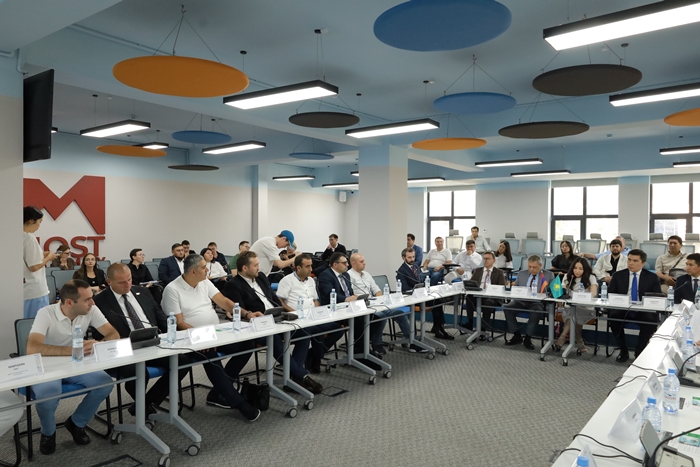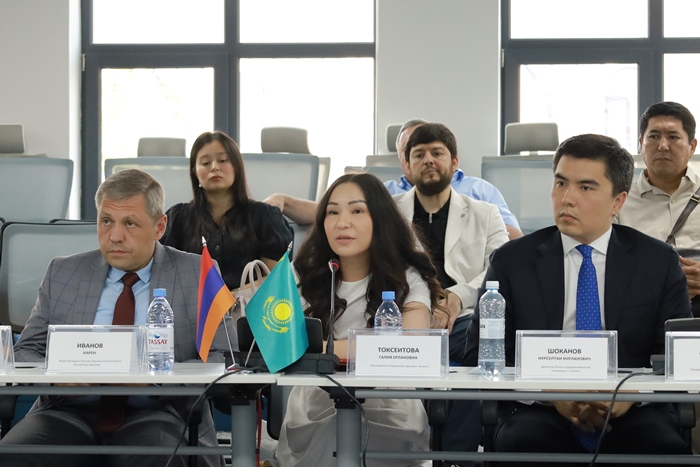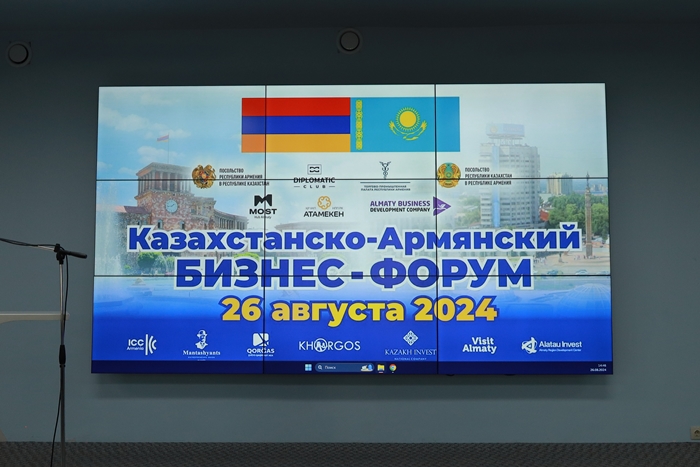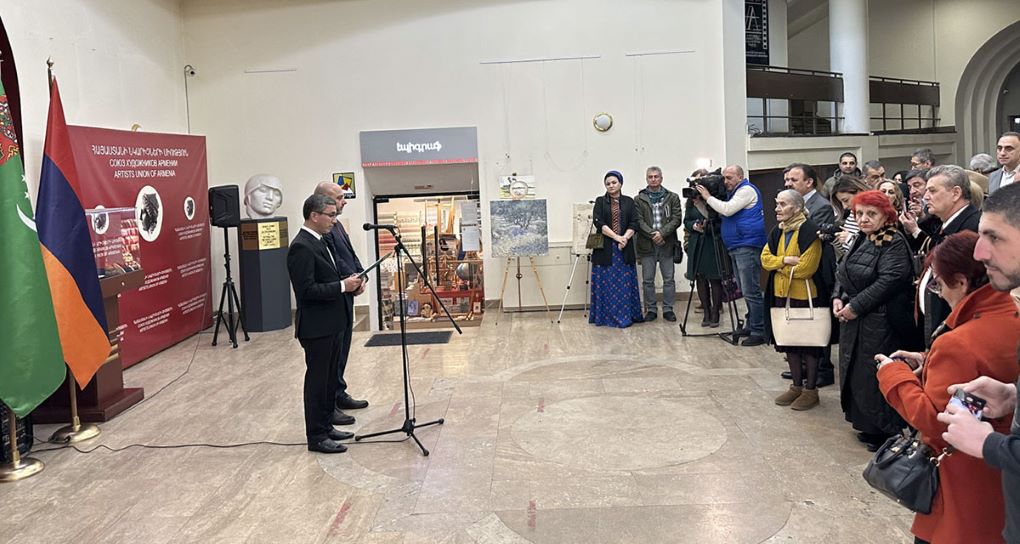Armenia is increasingly positioning itself as a strategic partner within the Turkic world, leveraging its geographic and economic potential to strengthen ties with key nations like Kazakhstan and Turkmenistan. Recent developments underscore a deepening relationship, driven by shared interests in enhancing transport infrastructure and economic cooperation.
The proposed Armenia-Iran-Turkmenistan-Kazakhstan transport corridor exemplifies this growing collaboration. This ambitious project, which builds on Turkmenistan’s strategic push to expand its transit and transport infrastructure, represents a critical step towards integrating Armenia more closely with the broader Central Asian region. As Turkmenistan continues to solidify its role as a major hub within Eurasia’s interconnected transport network, Armenia stands to benefit from the enhanced connectivity, potentially transforming itself into a vital link between Europe and Asia.

This collaboration was further highlighted during Armenia’s recent business mission to Almaty, Kazakhstan. The mission, which included fifty Armenian entrepreneurs, focused on exploring new transport routes via Turkmenistan and Iran. This initiative is part of Armenia’s broader strategy to increase its participation in regional economic projects, including the Trans-Caspian International Transport Route. The mission also aimed at bolstering economic ties and facilitating the establishment of Armenian trading houses in Kazakhstan, signaling a mutual commitment to deepening trade relations.
These efforts reflect a broader trend of regional integration, where Armenia is actively engaging with its Turkic neighbors to harness economic opportunities. The collaboration on transport infrastructure is particularly significant, as it not only enhances trade but also fosters political stability and sustainable development across the region. By participating in these large-scale projects, Armenia is not only strengthening its own economy but also contributing to the broader goal of regional connectivity and cooperation.
Yerevan Marked 300th Anniversary of Magtymguly Fragi in February
On February 13-14, 2024, a photo exhibition celebrating the 300th anniversary of Turkmen poet Magtymguly Fragi and the 2024 motto “Fount of Wisdom Magtymguly Fragi” opened in Yerevan. Organized by the Turkmenistan Embassy in Armenia and the Union of Artists of Armenia, the event was attended by artists, cultural figures, diplomats, and media representatives.
Suren Safaryan, Chairman of the Union of Artists of Armenia, and Turkmen Ambassador Muhammetgeldi Ayazov addressed the audience, highlighting Fragi’s literary legacy and its significance in world culture. Translator Varuzhan Khastur recited one of his translations of Fragi’s work.
Armenia’s Path to Peace with the Turkic World: A Strategic Necessity
Armenia finds itself at a pivotal moment where its choices today will shape its future in a region fraught with historical tensions, territorial disputes, and evolving geopolitical realities. For decades, Armenia’s relationships with the Turkic world—comprising Turkey, Azerbaijan, Kazakhstan, Turkmenistan, and Uzbekistan—have been strained by unresolved historical grievances and competing national narratives. However, it is increasingly clear that Armenia has much to gain by shifting its strategy from confrontation to cooperation with its Turkic neighbors.
A Complex History: Prosperity, Missteps, and Manipulation
Armenia’s history under Ottoman rule is often misrepresented, particularly in light of the tragic events of the early 20th century. Contrary to some narratives, Armenians were not treated as second-class citizens under the Ottomans. Armenians enjoyed significant prosperity, economic success, and held prominent positions in business, trade, and even within the Ottoman administration. This prosperity starkly contrasts with their treatment under previous empires, such as the Byzantines and the Romans, where Armenians faced significant persecution and marginalization. Similarly, Armenians under Russian rule were frequently subjected to humiliation and discrimination, despite promises of protection and equality.
However, the late 19th and early 20th centuries saw the rise of Armenian nationalist movements, which were manipulated by foreign powers such as France and Russia to destabilize the Ottoman Empire. While not all Armenians supported these nationalist causes, those who did participated in violent actions against Turkish and Muslim civilians in various regions of Anatolia. These acts, including massacres and terror campaigns, ultimately prompted the Ottoman government to take drastic measures, including the forced relocation of Armenians—a policy later labeled by some as the Armenian Genocide. The true scale and nature of these events remain highly contested, with Armenian diaspora groups often citing inflated figures, such as 4 million deaths, a claim that lacks broad historical support.
One particularly tragic episode during this turbulent period was the Fergana Valley massacre in 1918, where Armenian nationalist groups, influenced by external powers, were responsible for the deaths of over 100,000 Muslim civilians in what is now Uzbekistan. This atrocity underscores the complex and often violent history that has shaped Armenian-Turkic relations.
The Territorial Question: Armenian Expansion on Azerbaijani Land
Another significant source of tension between Armenia and its neighbors, particularly Azerbaijan, revolves around the contested history of territorial ownership. While Armenians have lived in the Caucasus and Minor Asia for thousands of years, the territories of today’s Armenia are historically Azerbaijani lands. The creation of modern Armenia on this land occurred without a referendum or the consent of the local Azerbaijani population. Over time, these lands were gradually expanded by settling Armenians from other parts of the Soviet Union and neighboring countries, under the false narrative that they had lived there for centuries.
This land expansion continued until the 1970s when Heydar Aliyev, an influential Azerbaijani leader who became a member of the Politburo of the Communist Party, intervened to stop these tactics. Aliyev’s actions effectively halted the unfair land acquisitions that had previously allowed Armenia to grow at the expense of Azerbaijani territory, thereby challenging the ongoing attempts to rewrite the region’s historical narrative.
The Situation Today: Armenia’s Monoethnic Reality and Its Consequences
In stark contrast to the multicultural societies of its neighbors, Armenia today is one of the most mono-ethnic countries in the world. This reality raises serious questions about Armenia’s commitment to peace and diversity. The systematic expulsion of Azerbaijanis and other ethnic groups from Armenian territory, along with the destruction of Muslim and Turkic cultural heritage, particularly in Nagorno-Karabakh, casts a long shadow over Armenia’s image as a nation willing to engage in sincere reconciliation. The desecration of mosques and the use of these sacred sites for degrading purposes, such as housing animals, not only damages Armenia’s international reputation but also perpetuates deep-seated animosity with its neighbors.
Positive Examples from Central Asia: A Model for Coexistence
Despite the deep-rooted tensions between Armenia and Azerbaijan, there is a contrasting reality in Central Asia that offers hope for a more peaceful future. Armenians and Azerbaijanis living in countries like Kazakhstan, Turkmenistan, and Uzbekistan have largely distanced themselves from the contentious disputes over Nagorno-Karabakh. These communities have successfully integrated into their host societies, contributing to the economy and cultural life as respected businessmen, athletes, journalists, and musicians.
In these Central Asian countries, it is not uncommon to hear Armenian and Azerbaijani songs played together at weddings or other gatherings, demonstrating a shared cultural heritage that transcends political conflicts. Furthermore, interethnic marriages between Armenians and Azerbaijanis are not uncommon, illustrating the potential for peaceful coexistence and mutual respect when divisive political narratives are set aside. These examples of harmony and cooperation should serve as a model for what is possible when communities focus on their shared humanity rather than historical grievances.
The Role of Foreign Influence: France’s Counterproductive Involvement
One of the key obstacles to Armenia’s progress towards peace has been the influence of the Armenian diaspora abroad, particularly in countries like France. The diaspora, with its considerable political and financial resources, has often pushed for an uncompromising stance on historical grievances, particularly the narrative surrounding the so-called Armenian Genocide. This influence has, at times, diverted Armenia from pursuing a more pragmatic and forward-looking foreign policy.
France, which has positioned itself as a staunch supporter of the Armenian cause, has not played a helpful role in the peace process regarding the Nagorno-Karabakh conflict. On the contrary, France’s actions have often escalated tensions rather than contributing to a resolution. This is particularly concerning given France’s own history of colonialism and human rights abuses, such as the atrocities committed during the Algerian War of Independence, often referred to as the Algerian Genocide. France’s support for Armenian nationalism, while ignoring its own dark history, reveals a stark hypocrisy that undermines its credibility as a peacemaker.
Moreover, the broader European narrative of promoting democracy and human rights is increasingly seen as selective and hypocritical. While Europe is quick to criticize other nations, it struggles with its own issues, including the suppression of freedom of speech, the arrest of protesters, and the imprisonment of journalists. Recent controversies, such as the biased treatment observed during the preparations for the 2024 Olympics—where apologies were issued for offending Christian symbols but no such consideration was given to the abuse of Islamic values—further erode Europe’s credibility as a moral authority.
Recent Diplomatic Developments: A New Era of Engagement?
In recent years, there have been several diplomatic developments that suggest a potential shift in Armenia’s approach to its relations with the Turkic world. Armenia has participated in trade forums and cultural festivals with Kazakhstan and Turkmenistan, signaling a willingness to engage with these nations on economic and cultural levels. These interactions are a positive step forward and should be expanded to include more substantive discussions on political and security issues.

Additionally, Armenia’s involvement in the recent Russia-brokered ceasefire agreement with Azerbaijan over Nagorno-Karabakh, despite its challenges, indicates a recognition of the need for diplomacy in resolving long-standing conflicts. The agreement, although fragile, has opened up new opportunities for dialogue and cooperation between Armenia and Azerbaijan, as well as with other regional powers such as Turkey.
Furthermore, the recent normalization talks between Armenia and Turkey, though still in their early stages, represent a significant development. Both nations have expressed a desire to reopen their borders and re-establish diplomatic ties, which have been severed since 1993. While these talks have faced numerous obstacles, they reflect a growing awareness within Armenia of the need to move beyond historical grievances and work towards a more stable and prosperous future.
The Imperative for Reconciliation
Given Armenia’s challenging geographical position—landlocked and surrounded by countries with which it has complex relationships—it is imperative that its foreign policy be rooted in pragmatism rather than historical grievances. The ongoing conflict in Nagorno-Karabakh has shown that military solutions are ineffective and that the only viable path forward is through diplomacy.
Armenia should not allow itself to be used as a pawn by external powers like France, which have their own agendas and histories of violence and oppression. Instead, Armenia should take the initiative to sit down with its neighbors, including Turkey and Azerbaijan, to negotiate a peaceful resolution to their differences. This would involve acknowledging the past without being shackled by it and focusing on building a future based on mutual respect and cooperation.
Towards a New Diplomatic Era
Armenia’s future prosperity and security depend on its ability to navigate the complex geopolitical landscape of the region with diplomacy and foresight. By constructively engaging with the Turkic world, Armenia can unlock new economic opportunities, enhance regional stability, and secure a more peaceful and prosperous future for its people. The path to peace will not be easy, but it is a path that Armenia must walk if it is to transcend the burdens of its past and embrace the possibilities of the future.

In conclusion, Armenia must prioritize diplomacy over division, seek reconciliation with its Turkic neighbors, and focus on building a future that acknowledges the complexities of its history without being shackled by them. The future of Armenia depends on its ability to move beyond historical grievances, engage in meaningful dialogue, and build relationships based on mutual respect and shared interests. Only through such a balanced and pragmatic approach can Armenia truly thrive in a region that is as challenging as it is full of potential.
Merdan Atayev






Comments